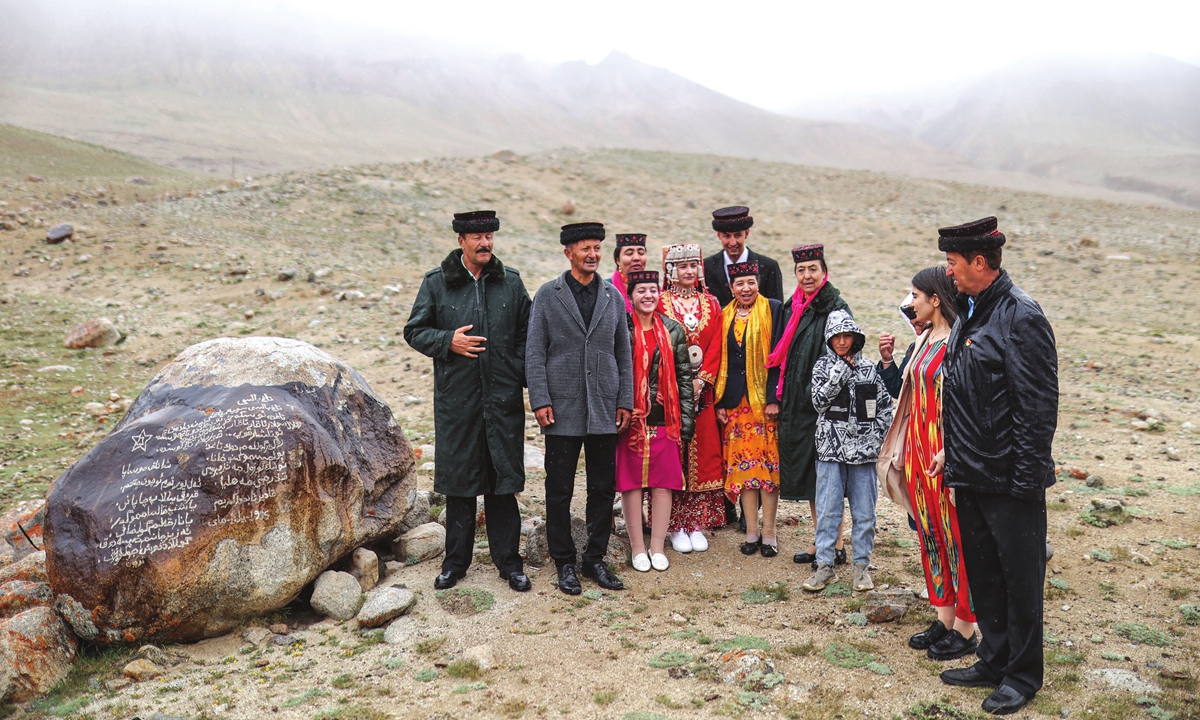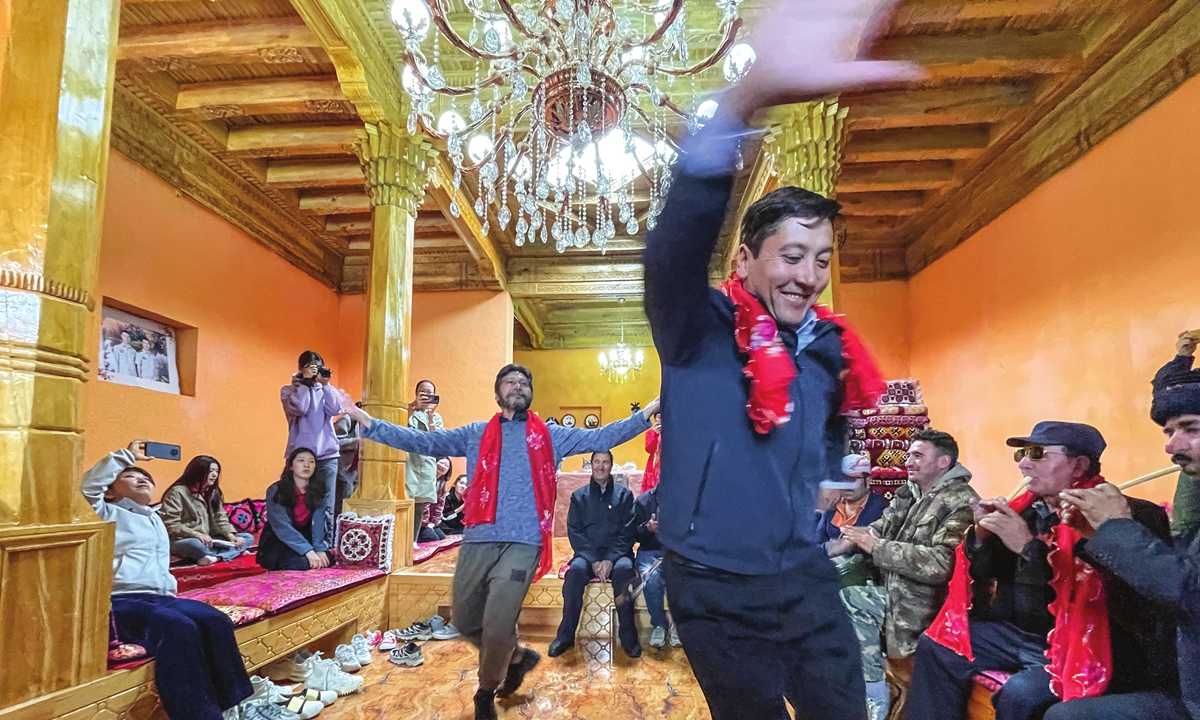August 1 marks the 96th anniversary of the founding of the Chinese People’s Liberation Army (PLA). Recently, the Global Times participated in the “Big Country Borderland” project launched by prestigious Renmin University of China, conducting social research along the Kashi line. Together with the teachers and students from university, the Global Times journeyed to Taxkorgan Tajik autonomous county in Xinjiang Uygur Autonomous Region in Northwest China. It is the homeland of the hero Laqini Bayika, a Tajik herdsman who devoted his life to patrolling China’s northwestern border and sacrificed his lives while trying to rescue a child who had fallen into an ice hole. While there, the Global Times witnessed magnificent sentiments of the border guards rooted in the borderland, safeguarding and promoting its development.

The scenery in Taxkorgan Tajik autonomous county Photo: VCG
The 314 National Highway is busiest during the summer, and it is a route favored by adventure enthusiasts. Only during this time does the Pamir Plateau temporarily shed its aloof demeanor and welcomes visitors from all directions with its majestic scenery.
Tourists may not be aware that there is a group of people who witness this aloofness all year round, silently guarding the stability of the borderland – they are the Tajik border guards.
Today, they still appreciate and practice their duties of safeguarding and developing the borderland despite the remoteness and harshness present there, as Laqini Bayika once did.
A day with four seasons
Leaving the rich and magnificent night life of Kashi is leaving the civilized world.
But what stands in the way of exploring the strength supporting this prosperity is a long journey ahead toward the west.
The Taxkorgan Tajik autonomous county is located at the eastern foot of the Pamir Plateau, at the junction of the Karakoram Mountains, the Hindu Kush Mountains, and the Alay Mountains, with an average altitude of over 3,600 meters.
It is connected to Tajikistan, Afghanistan, and Pakistan in the northwest, southwest, and south, respectively. The Taxkorgan Tajik autonomous county belongs to the Kashi prefecture, where the prosperity of the city and the glaciers of the plateau converge constitute the vastness and richness of Xinjiang region.
Driving 300 kilometers southwest along the 314 National Highway from Kashi city for nearly a 6-hour-long journey, people will experience a peculiar transition from “summer to winter.” As the Baisha Lake and the Muztagh Ata Peak appear one after another, the snack packs bulge like balloons, and people wrap their jackets tight – the research team has entered a high-altitude area.

Children in Xinjiang Uygur Automonous Region Photo: Fan Lingzhi/GT
Rain is not common in the Taxkorgan Tajik autonomous county, but when it greeted the guests from the capital city of China, the temperature suddenly dropped to below 10 C, seemingly to allow the research team to deeply experience the harsh climate faced by the border guards who patrol the area.
Things were not as simple as imagined, when the research team arrived at the Khunjerab Pass at an altitude of 5,100 meters, the rain suddenly turned into swirling snowflakes accompanied by cold winds.
However, this unexpected ice and snow ignited a passion to see and experience more, and in front of the towering national gate, the teachers and students that comprised the research team shouted in unison, “Long live the motherland!”
“It feels like being drunk, but I’m not sure whether it was due to excitement or hypoxia,” a student with the research team told the Global Times.
A special family ritual
“Forever following the Communist Party of China (CPC), guarding the country for a lifetime!” On July 28, Longjike Kadeer, a retired soldier, led Afuzi Jiaerman, his newlywed nephew, and other family members to the “Family Motto Stone” located in the border area between China and Tajikistan to make a solemnly oath.
In 1979, at the age of 17, Longjike enlisted in the military encouraged by his father. In 2008, Longjike retired with honors from the position of deputy director of Southern Xinjiang headquarters under the Xinjiang border defense corps of the People’s Armed Police.
His selfless dedication earned him the titles of “The Most Beautiful Retired Soldier” and “National Model Retired Soldier.” He also served as a torchbearer for the 2022 Beijing Winter Paralympics.
On that morning when Longjike and his family made their way to the sacred spot, it was raining in the Paiyike River area on the Pamir Plateau. Despite the bad weather and the mountain roads often being washed away by rainwater, Longjike insisted on taking the newlyweds to perform a solemn family tradition: Taking an oath to guard the country by the “Family Motto Stone” located at an altitude of 4,200 meters in the border area between China and Tajikistan.

The family of Longjike gather at the family motto stone in Taxkorgan Tajik autonomous county in Xinjiang Uygur Autonomous Region on July 28, 2023. Photo: Fan Lingzhi/GT
It is a traditional ritual for Longjike’s family, who have been guarding the border for four generations.
The family is famous for border defense on the Pamir Plateau. From Longjike’s grandfather to his son, the family has been serving the country at the border for more than 70 years. Media sources reported that this border defense family has cultivated 53 Party members, 22 soldiers and police officers, and 84 border guards.
In 2008, after retiring, Longjike gave up the opportunity to live in Urumqi and chose to stay on the plateau to assist in border defense, becoming a volunteer border guard in the Kashi Border Management Detachment.
He told the Global Times that his father was the prototype of the soldier Amir in the classic movie “Visitors on the Ice Mountain.”
Afuzi Jiaerman is the fourth generation of soldiers in this border defense family. He served in the army in Xizang (Tibet) Autonomous Region and became a special police officer in the town police station’s special operations team in the Taxkorgan Tajik autonomous county after retiring in 2020. Just a week ago, he and his fiancee tied the knot.
Longjike’s family “Family Motto Stone” is oval-shaped, with the emblem of the PLA and a paragraph etched in ethnic script which reads: “Guarding the border and loving the country is the most glorious. I hope my descendants will guard the border and love the country for a lifetime…”
According to Longjike, this “Family Motto Stone” was set up according to the wishes of his grandfather, Abulikemu, a Tajik militia border guard, and was established by himself and his father Kadeer.
“Grandfather, please rest assured that I have inherited your aspirations. After graduating from university, I will proudly join the PLA and, after retiring, I will proudly join the People’s Police,” Afuzi vowed, “I have some good news for you – I am married now, and your grandson will continue to inherit the red gene. Please rest assured!”
Afuzi told the Global Times that before joining the army, he also came to the “Family Motto Stone” to take an oath. Whenever there are important events in the family, they always come here to report to their ancestors and take oaths. This has become a traditional ritual for this four-generation Tajik border defense family.
The vow of fearlessly sacrificing
It was already 3 pm in the afternoon when the research team returned to Paiyikegoukou guard station located at the foot of the mountain. Longjike asked his family members to serve hot yak meat to warm everyone. The house was simply decorated, with iron bunk beds arranged in a circle around a central stove.
“This is a house built by the government for the border guards. We have access to electricity and water and new roads were also built here. The border guards also receive a monthly subsidy of 2,600 yuan ($363),” Longjike told the Global Times.
He often takes other border guards on rounds. For him, the most important tradition for the border guards is patriotism which he wants to pass down to the younger guards. Moreover, during the mountain patrols, which are often in remote areas, they frequently encounter sudden dangerous situations. “So hands-on teaching is necessary,” he said.

Tajik people perform traditional dance for visiting guests in Taxkorgan Tajik autonomous county 0n July 29, 2023. Photo: Fan Lingzhi/GT
According to him, in the border areas, the main force of the border defense consists of the PLA officers and soldiers, and the border police. The border guards are responsible for assisting in the work. Border guards at the patrol points are rotated every 15 days, and those who are replaced return home to take care of farming and herding. In this way, one patrol point can cover an area of at least 40 to 50 kilometers in the mountains.
The next day, Longjike invited the research team to visit his home. He told the students and teachers in the research group that “in my opinion, whether the motherland is strong in defense on Xinjiang region and whether Xinjiang is strong in defense on the Taxkorgan Tajik autonomous county, the county needs intellectuals like you, and I hope you can visit often and work together to build our beautiful Xinjiang!”
Zhou Xiaohui, a teacher from the Renmin University of China, said “Border guards demonstrate year after year what patriotism means. Today, as we have gotten closer to them, we have a deeper understanding that individual pursuits should align with the country’s needs, and individual ideals should merge with the country’s destiny.”
Longjike was in high spirits that day and performed a traditional Tajik eagle dance in his “blue house” (a Tajik traditional civil structure house) to entertain everyone. The atmosphere was warm and contagious, and everyone joined in.
In the small county, there are, in fact, many people like Longjike who protect the country. The Global Times noticed that every household displays the honors they have received prominently.
After leaving Longjike’s home, the Global Times went to Bandier village near the Taxkorgan Khunjerab Airport. Kezilikeli Daximaimaiti, who won the title of “The Most Beautiful Family in the Country” in 2019, is a female border guard who lives in the village with her three daughters.
Similar to Longjike’s home, Kezilikeli’s house is clean and spacious. The gratitude wall at the entrance is adorned with various posters, such as the “one household, one policy for poverty alleviation.” The poster details the time of house construction, housing level, insurance status, and water usage in Kezilikeli’s home. Under the “employment” section, it is noted “Maintaining stable employment for three people, with an annual wage income of 72,300 yuan.” Additionally, there are agricultural income and policy forms of income, which brought Kezilikeli’s family’s a per capita net income of 35,473 yuan in 2022.
He Jinming, the first secretary of Bandier village, told the Global Times that there are 118 households in the village with a total of 428 people, of which 110 are border guards, and female border guards like Kezilikeli account for approximately 30 percent of the total.
Mula Abifu, deputy director of the education bureau of the Taxkorgan Tajik autonomous county, told the Global Times that “the Tajik border guards are very loyal to the country. Back then, when they were carrying out construction in the border area at an altitude of 5,200 meters, the ground was covered with permafrost. First, they had to use a blowtorch to soften the ground. People from other parts of the country would not come here even if they were offered 5,000 yuan, but our border guards volunteered to participate in the construction, and the women would make nang (a toasted wheat flatbread) at home and send it up.”

The scenery in Taxkorgan Tajik autonomous county Photo: Fan Lingzhi/GT
“Patriotic border protection is what our ancestors have been doing for generations. Our elders have personally experienced the development and changes here, and witnessed the country’s fast development from scratch,” Mula Abifu said.
“Now many people in other countries are envious of us. Some people here do business with neighboring countries, and the people from neighboring countries often tell them ‘Your country is really a great country.’ After the reopening of the port, they came in large numbers. Even the most common rock sugar is precious to them. This is why our confidence in guarding the border is stronger, and why we can sacrifice a small family for the greater good,” he stressed.
The Global Times learned that in order to ensure a new crop of border guard recruits, all parts of the Taxkorgan Tajik autonomous county have their own methods. Taking Bositebandier village as an example, where the village party branch implemented the “training border guards into party members,” a system by which border guards who are Party members are trained to become village-level reserve forces.
Grassroots party organizations lead the border guards to make continuous progress, and the border guards drive the masses to develop together.
Through these measures, the border guards not only become loyal defenders of guarding the border, but also grow into practitioners and promoters of grassroots Party organizations in the new era to connect with and serve the people.
(Global Times)




